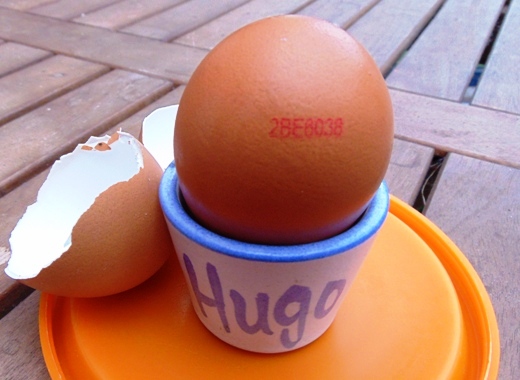A hardboiled egg can, peeled, keep several weeks in water. If necessary, add lemon, vinegar or salt. The water will have some yellow color, which is normal.
Rubbing the shell with oil also offers some protection (sealing).
The famous cookbook of the peasant women federation (1963) points that keeping eggs in lime water is a good method.
‘Slake a kilo of fresh, fat lime and dissolve it in 10 liters of water. Arrange the eggs in a pure clay pot. Stir in the lime water considerably and pour over the eggs. On top forms a crust that seals the air.’
(The clay pot must be glazed to prevent water loss.)
(Again, you better put the eggs with the tip down.)
Lime water is a clear solution of lime in water.
Calcium hydroxide, or slaked lime is an inorganic compound of calcium, Ca (OH)2. It is a soft white powder moderately soluble in water.
Calcium hydroxide can be prepared by adding water to calcium oxide (CaO). This creates a milky substance (milk of lime). If that is filtered, there remains a colorless, transparent solution of calcium hydroxide in water. This is referred to as lime water.
Even better to keep eggs is storing them under waterglass. One pours so 1 liter of water glass in 9 to 10 liters of boiled water, stir the mixture well and let stand until it’s cold. Meanwhile wash carefully and clean the fresh eggs, arranges them in a with soda and hot water cleaned Keulschen pot and pours the cold liquid it over, Soo, the eggs are completely covered.
(Keulschen pot: ceramic (stoneware) pot with a enamel coating, made in Cologne (Köln))
You might be able to keep them 1/2 to 3 years.
You can always add and remove eggs. Better write (in pencil) readable the date on them.
‘You can keep eggs long too when they’re wrapped in paper, placed in a box and this box reverses every eight days.’(Farmers’ Wives Association Cookbook 1963)
 A trick to peel a boiled egg quickly and completely: keep it in a bowl under water so the scale and the underlying membrane are preserved from drying out. Smach and roll it once firmly over the table and so you can pick off the shell without breaking into eighty-five pieces.
A trick to peel a boiled egg quickly and completely: keep it in a bowl under water so the scale and the underlying membrane are preserved from drying out. Smach and roll it once firmly over the table and so you can pick off the shell without breaking into eighty-five pieces.
Cooked we absorbe the proteins 2x better than raw. With over cooked eggs, the yolk shows some green color by the present iron and / or sulfur. This does not change the taste.
Half hard cooked are eggs in 6 to 9 minutes. You can prevent the shell bursts by puncturing a hole in the air chamber at the blunt end: the expanding air can escape then. You then of course harm the shell yourself and a part of the natural protection. To avoid this, you better slowly warm the egg(s). So do not put them from the refrigerator in boiling water, but acclimatized heating slowly and start in cold water. Adding salt or vinegar to the cooking water would promote clotting egg white from cracked eggs.
I do not use a kitchen timer. I let cook the water with the eggs about 30 counts, remove the pan from the heat and set them with lid. The yolk is always sufficiently solidified, and never faded.
You can also’cook’ eggs in the hot ashes beside a fire.
(See also <Hay box>)
Painting Eastern eggs
Boil 1 quart of water, 1 tablespoon of salt, 2 tablespoons of vinegar, and 2 tablespoons of the respective fruit, vegetable, or spice for 30 minutes. Strain the dye, and cool to room temperature before dipping your eggs. Color your Eastern eggs: dark blue: blueberries; light blue: red cabbage; beige: coffee; orange: onions; yellow: saffron or carrot turmeric; green: parsley or spinach; purple: red wine; pink: beets.
You can impose boiled eggs (peeled) in spicy vinegar.
Quail eggs I've already eaten canned, so you can also sterilize or pickle boiled eggs.
‘Never you know what will come out of an egg, a snake, a spider or just an omelet.’(Louis Paul Boon)
Egg Warmer : angora underwear. (Guy Mortier)
